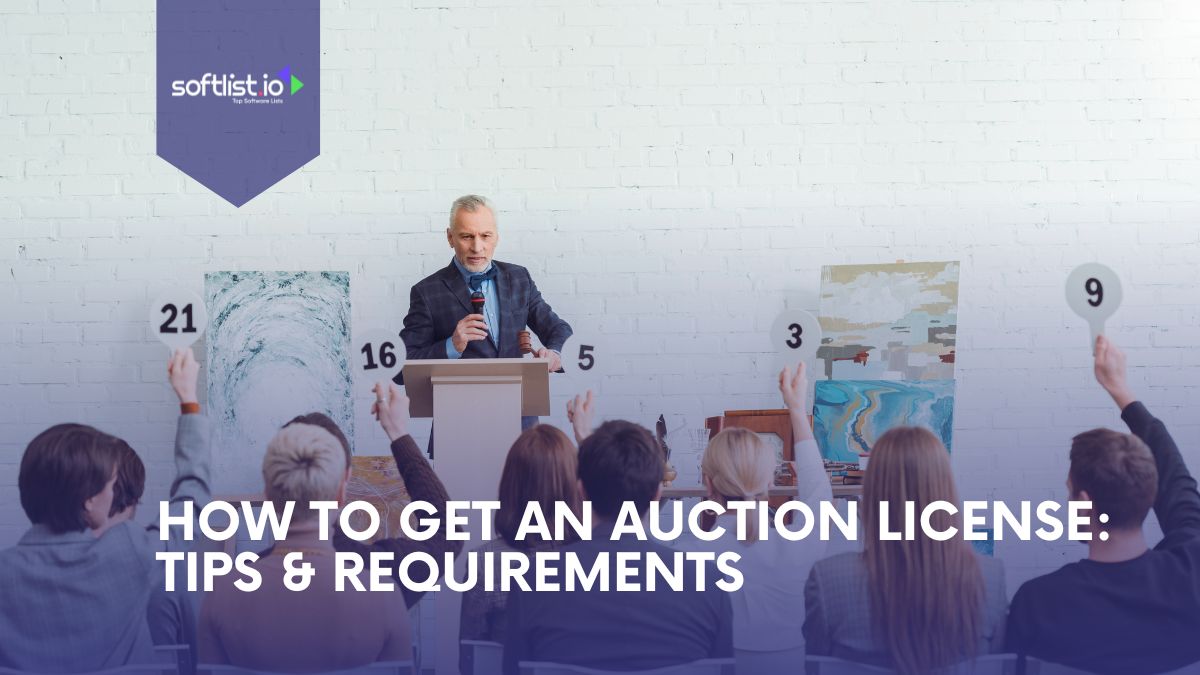Understanding how to obtain an auction license is crucial if you’re looking to break into the auction industry. Whether you want to sell used vehicles at auction or plan to hold auctions for other types of merchandise, having the right licensure is the first step. In some cases, you might also need an additional auto dealer license if your focus is on vehicles.
Each state or region has requirements for acquiring an auction business license, which means it’s essential to know the steps that apply to your location. In this guide, we’ll take you through a step-by-step process to help you obtain the license you need to start auctioning like a pro. Read now to get started on your path to becoming a licensed auctioneer!
What Is an Auction License?
An auction license is a permit that allows an individual or company to organize and run auctions legally. These auctions are events where items or services are sold to the highest bidder.
The license is issued by government agencies, and the auctioneer must follow the law, including rules about how to treat customers fairly, how to run their business, and how to handle taxes.
Different licenses exist for various kinds of auctions, such as those for selling real estate, cars, online sales, or charity events. The exact rules and types of licenses can vary depending on where you are.
Why Do You Need an Auction License to Conduct Auctions?
Source: Canva Pro
Requiring an auction license to conduct auctions is a regulatory measure by governments and professional bodies to ensure fairness, transparency, and professionalism within the auction industry.
Here are several key reasons for auction licenses:
Consumer Protection
Auction licenses help protect consumers from fraudulent activities and ensure that auctioneers adhere to ethical standards. Licensing requirements typically include a background check, which can prevent individuals with a history of fraudulent or unethical behavior from conducting auctions.
This builds trust among buyers and sellers, knowing that they are engaging in transactions overseen by vetted professionals.
Market Integrity
Licensing establishes a standardized level of knowledge and professionalism among auctioneers, which helps to maintain the integrity of the auction market.
Through education and examination requirements, auctioneers are expected to know auction laws, ethical practices, and specific industry standards, contributing to a more reliable and trustworthy market environment.
Legal Compliance
Auctions are subject to various laws and regulations, including contract law, consumer protection laws, and, in some cases, specialized laws (e.g., for real estate or automobiles).
Licensing ensures that auctioneers are aware of and comply with these legal requirements, thereby minimizing participant risks and reducing the potential for disputes.
Professional Development
The process of obtaining an auction license often involves education and training, which promote professional development among auctioneers.
This education covers various topics, including bid calling, auction marketing, and business management, enhancing the quality of service provided to clients.
Accountability
Licensed auctioneers are accountable to regulatory bodies or professional organizations, which can take disciplinary action in misconduct cases.
This accountability mechanism helps to ensure that auctioneers operate within the bounds of the law and ethical standards, providing recourse for consumers and clients in case of grievances.
Economic Regulation
Auction licenses can also serve as a tool for economic regulation, helping to prevent market saturation and ensuring that only qualified individuals conduct auctions.
By requiring licenses, authorities can monitor and control the number of active auctioneers, thereby contributing to a more stable and balanced market.
Specialization and Quality Assurance
Certain types of auctions, such as those for real estate, automobiles, or fine art, may require specialized knowledge and skills.
Licenses specific to these areas ensure that auctioneers have the necessary expertise, providing quality assurance to clients and participants in these specialized auctions.
Types of Auction Licenses
1. General Auctioneer License
This license allows individuals to conduct most types of auctions, including but not limited to personal property, real estate, and antiques.
General auctioneer licenses are the most comprehensive, covering various auction activities. Applicants typically must undergo a background check, complete an auctioneering course, pass an exam, and pay a licensing fee.
2. Real Estate Auction License
Specifically tailored for auctioneers who deal with the sale of real estate properties, this license might require additional education related to real estate law, appraisal, and sales.
Depending on the jurisdiction, real estate auctioneers might also need to hold a standard real estate license.
3. Online Auction License
With the rise of e-commerce, many auctions now take place online. Some jurisdictions have created licenses for online auction platforms to regulate this growing field.
These licenses may require adherence to digital commerce regulations, consumer protection laws, and possibly a bond to ensure fair practices.
4. Specialty Auction License
Certain types of auctions that deal with specific goods, such as automobiles, livestock, or firearms, may require a specialty auction license. These licenses ensure that auctioneers have the necessary knowledge and adhere to the regulations specific to the sale of these items.
5. Charity Auction License
A charity auction license may be required when auctions are conducted for charitable purposes. This type of license often has different or waived fees and may have less stringent requirements, recognizing the charitable intent of the auctions.
How to Get an Auction License
Source: Canva Pro
Getting an auction license involves a series of steps, which can vary significantly from one jurisdiction to another. However, there’s a general process that most aspiring auctioneers will need to follow to obtain their license.
Here’s a comprehensive guide on how to get an auction license:
Step 1: Research Your Local Requirements
The requirements for obtaining an auction license vary significantly from one location to another. For example, the process and prerequisites in the United States differ by state.
Some states may require you to complete several hours in auctioneering courses, while others might mandate apprenticeships under licensed auctioneers. Contact your state’s licensing board or Department of Professional Regulation to gather all necessary information.
Step 2: Attend Auctioneer School
- Why It’s Important: Though not always a strict requirement, attending an auctioneer school can provide valuable experience and education. It’s particularly beneficial for those who are not entering the profession through a family business.
- What You’ll Learn: Courses typically cover bid calling, marketing, basic business management, and other relevant topics to prepare you for a career in auctioneering.
- Options Available: Choose between on-site schools and virtual programs. The National Auctioneers Association (NAA) lists accredited schools in the US, Canada, and South Africa, and an affiliate in Australia, among other locations.
- Duration: Programs can range from a few weeks to a standard college semester, depending on the institution and your learning pace.
Step 3: Gain Practical Experience
Practical experience is invaluable in auctioneering. Some licensing authorities require candidates to have participated in several auctions or completed an apprenticeship.
Even if it’s not a formal requirement, working with an established auctioneer can provide insights into the profession and enhance your skills in bid calling, auction planning, and item valuation.
Step 4: Pass the Licensing Examination
The auctioneer licensing exam is a critical step in the process. It typically tests your knowledge of auction laws, ethical practices, and sometimes, your bid-calling ability.
Preparation is key, so consider taking practice tests or additional study sessions if offered by your educational institution or a professional organization.
Step 5: Submit Your Application and Fee
Once you’ve met the educational and experiential requirements and passed your exam, you must complete and submit an official application for your auction license.
This application will likely require personal information, proof of your education and experience, results from your licensing exam, and a fee.
This application fee varies by jurisdiction but generally involves a fee of $100, which encompasses a $50 license fee and a $50 contribution to the Auctioneer Recovery Fund.
Step 6: Consider Additional License Requirements
Some states or countries may have additional requirements for auctioneers, such as undergoing a background check, securing a bond, or obtaining a sales tax permit if you sell taxable items.
Ensure you’re aware of and comply with these additional requirements before beginning your career as an auctioneer.
Additional Tips
- Stay Informed: Regulations and requirements can change, so staying up-to-date with your local auctioneer association or licensing board is important.
- Network: Building relationships with other auctioneers and professionals in the industry can provide support and open up opportunities.
- Specialize: Consider specializing in a particular type of auction or item to differentiate yourself and attract specific clients.
How to Get a Car Auction License
Source: Canva Pro
To get a car auction license, you must follow a multi-step process, which can vary depending on your location. Here’s a general overview of the steps you might need to take.
Please note, it’s essential to check the specific requirements in your state or country as regulations can differ significantly:
1. Understand the Requirements
- Local Regulations: Research the specific licensing requirements for car auction dealers in your state or country. This information is usually available on your local Department of Motor Vehicles (DMV) website or equivalent regulatory body.
- License Type: Determine whether you need a wholesale dealer license (selling cars to other dealers or businesses) or a retail dealer license (selling cars directly to the public).
2. Register Your Business
- Business Structure: Decide on a legal structure for your business (e.g., sole proprietorship, partnership, LLC) and register it with the appropriate government agency, often the Secretary of State.
- Tax Registration: Apply for a sales tax license with your state’s Department of Revenue.
- Employer Identification Number (EIN): Obtain an EIN from the IRS if you plan to hire employees.
3. Establish a Place of Business
- Office Requirements: Ensure you have a permanent business office to keep records and conduct business. This office must comply with local zoning laws.
- Signage: Your business premises should have a sign with your business name and hours of operation.
- Inspection: Some states require your business premises to be inspected before you can obtain a license.
4. Complete a Criminal Background Check
- Many states require auction license applicants to pass a criminal background check. You may need to provide fingerprints and possibly complete a personal history questionnaire.
5. Submit Your Application
- Application Form: Fill out the car auction license application form available from your local DMV or regulatory body. Some areas may allow online applications, while others require paper applications to be mailed in.
- Supporting Documents: Attach all required documentation, including proof of business registration, tax registration, EIN, zoning compliance, and any other documents specified by your state.
- Fees: Pay the required application and licensing fees. These can vary widely from one jurisdiction to another.
6. Provide a Surety Bond and Insurance
- Surety Bond: Obtain a surety bond to guarantee your compliance with state laws and regulations. The amount required and the cost will depend on your credit history and the bond amount.
- Insurance: Some states also require a specific type of liability insurance, such as a garage liability policy.
7. Await Approval and Inspection
- Processing Time: After submitting your application, there may be a waiting period while your application is reviewed. This period varies by state.
- Inspection: If required, an inspector may visit your business premises to ensure compliance with state regulations.
8. Auto Auction License Issuance and Renewal
- Receiving Your License: Once your application is approved, and any inspections are passed, your car auction license will be issued.
- Renewal: Keep track of when your license needs to be renewed and the requirements for renewal, as most licenses are valid for a limited time.
Final Thoughts
Getting an auction license might seem daunting, but it’s a crucial step for anyone eager to start in the auction world. Our guide breaks down this process into manageable steps, ensuring you understand everything from basic requirements to state-specific rules. With this guide, you’re ready to take on the auction industry. Get your auction license today and start bidding at auction sites online!
As you start, remember that smooth and secure transactions are crucial for success. That’s why considering online payment services is important. They make payments easier and safer for you and your customers, enhancing the overall experience.
If you’re curious about how Online Payment Services can benefit your business, check out more information here on our website. It’s a smart step towards enhancing your auction services. While you’re here, hit the subscribe button to get the hottest deals and discounts on selected software.
Frequently Asked Questions
What Type of License Is Required to Run an Auction Business?
To run an auction business, you need an auction dealer license, which permits you to legally conduct auctions, including vehicle auctions, within your jurisdiction. Specific requirements may vary depending on your location.
What Are the Requirements for Obtaining a Vehicle Auction License?
Requirements for obtaining a vehicle auction license typically include completing a pre-licensing course, submitting a dealer license application, paying applicable fees, securing an auto dealer bond, and verifying that your business meets local zoning laws.
How Much Does It Cost to Get an Auction Dealer License?
The cost to get an auction dealer license varies by state and type of license but generally includes application fees, bond premiums, and other associated costs. On average, you can expect to spend several hundred to a few thousand dollars.
What Is the License Application Process for a Motor Vehicle Auction License?
The motor vehicle auction license application process involves submitting an application to the relevant motor vehicle commission, providing proof of insurance and bonding, and meeting all regulatory requirements. The process can take up to 30 days or more to complete.
How Can I Verify If a Car Dealership Is Properly Licensed?
To verify if a car dealership is properly licensed, you can check with your state’s motor vehicle commission or licensing authority. They maintain a database of currently licensed dealerships and can provide verification upon request.
What Are the Next Steps After Obtaining an Auction Dealer License?
After obtaining an auction dealer license, the next steps include setting up your auction company, complying with all regulatory requirements, and starting your auction business. It’s important to stay informed about industry practices and regulations to remain compliant.
How Long Does It Take to Process and Get an Auction License?
The time it takes to process and get an auction license varies but generally ranges from a few weeks to 30 days, depending on the efficiency of your local motor vehicle commission and the completeness of your application.
Do I Need a Used Car Dealer License to Operate a Motor Vehicle Auction?
Yes, in most states, you need a used car dealer license to operate a motor vehicle auction. This ensures that you are compliant with state regulations and can legally conduct auctions involving used motor vehicles.
What Should I Do If My Auction License Application Is Denied?
If your auction license application is denied, you should contact your state’s motor vehicle commission to understand the reasons for the denial. You may need to address specific issues or provide additional documentation before reapplying.








